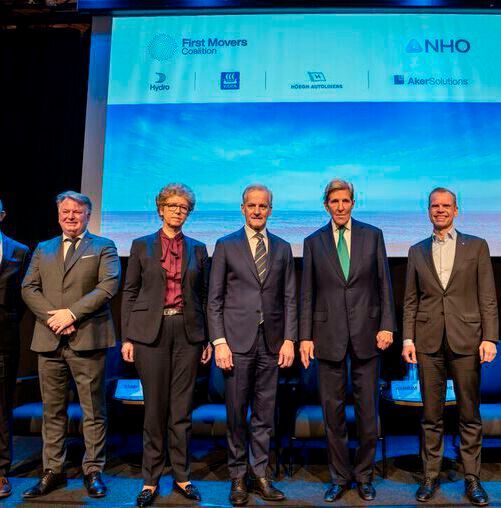First Movers Coalition U.S. Special Presidential Envoy for Climate Discusses Decarbonization of Hard-to-Abate Sectors
Related Vendors
The U.S. Special Presidential Envoy for Climate, John Kerry recently discussed the decarbonization of the world's heavy-emitting sectors with Norwegian members of the First Movers Coalition in Oslo.

Oslo/Norway – John Kerry, U.S. Special Presidential Envoy for Climate recently met with Norwegian Prime Minister, Jonas Gahr Støre, and Norwegian members of the First Movers Coalition (FMC) in Oslo to discuss decarbonization of the world's heavy-emitting sectors.
“Taken together, the First Movers Coalition represents a 16-billion-dollar demand signal for goods in 2030 - the largest private demand signal for clean technologies in history. These companies are making commitments to change the way we procure some of our most basic goods: steel, aluminum, concrete, as well as jet fuel and shipping. And our friends in Norway have been first movers even within this group, taking concrete and tangible actions to meet these commitments,” said John Kerry, U.S. Special Presidential Envoy for Climate.
FMC was launched at COP26 to help decarbonize the world's heavy-emitting sectors via private sector demand for decarbonization technology. Two years on, it has become a leading global coalition of 96 companies spearheading a multitude of collaborative partnerships and new business models. Seven Norwegian companies are members of FMC: Yara International, which was one of the founding members, Hydro, Aker Biomarine, Choose, Höegh Autoliners, Norsk Stål and Norge Mining.
“The green shift is not about subsidies, it’s about investments. We must collaborate across entire value chains, and between both private and public sectors. Many solutions to decarbonize already exist, but demand and supply must be developed simultaneously. That is why Yara is working to realize the world’s first clean ammonia-powered container ship, Yara Eyde, whilst also working to produce and use low-carbon ammonia to decarbonize shipping fuel, the food industry and other energy-intensive industries,” said Svein Tore Holsether, CEO of Yara and NHO President.
FMC targets sectors that do not have cost-competitive energy alternatives to fossil fuels: steel, cement, aluminium, chemicals, shipping, aviation, and trucking, as well as carbon capture. Combined, these sectors represent more than one third of global carbon emissions.
Collectively, member companies have made 120 commitments for climate action, which represent a demand for emerging climate technologies at 16 billion dollars annually by 2030. The use of these technologies will represent 31 million tons (Mt) CO2 equivalents in annual emission reductions. By comparison, total annual emissions in Norway were 48,9 million tons in 2022.
(ID:49916252)



:quality(80)/p7i.vogel.de/wcms/cd/a2/cda26729e2338c016980a01f6042d5d8/0116559206.jpeg)
:quality(80)/p7i.vogel.de/wcms/9c/4a/9c4a5a43e8d6615241344fa2bf69c6bd/0116498595.jpeg)
:quality(80)/p7i.vogel.de/wcms/79/45/794528e5411b0a8e89a146d29dfa61f6/0116025617.jpeg)
:quality(80)/p7i.vogel.de/wcms/2d/f3/2df3a00266bcd5912a4464d98f30e3f4/0116002054.jpeg)
:quality(80)/p7i.vogel.de/wcms/83/62/8362a9988dd3ce5297265a58f0889f8e/0116655755.jpeg)
:quality(80)/p7i.vogel.de/wcms/da/ef/daef223cf8d2361017b62a458c6ea0b0/0116631916.jpeg)
:quality(80)/p7i.vogel.de/wcms/7c/1f/7c1ff7c7d6dd975d801ef598570a5813/0116631220.jpeg)
:quality(80)/p7i.vogel.de/wcms/a6/f8/a6f8e9fe71d701d8bb55a062d3345cbb/0116610864.jpeg)
:quality(80)/p7i.vogel.de/wcms/c3/ad/c3ad79e797e4d8b5f494ea097aa58045/0115572380.jpeg)
:quality(80)/p7i.vogel.de/wcms/2f/dc/2fdc39af2c7f5d71b2a34aca488985dc/0115467614.jpeg)
:quality(80)/p7i.vogel.de/wcms/53/e4/53e4dddad84bde5b0e31eb3677c77f62/0115064907.jpeg)
:quality(80)/p7i.vogel.de/wcms/b0/c4/b0c445515b702a965e7725b1c0b0d460/0114855017.jpeg)
:quality(80)/p7i.vogel.de/wcms/22/b5/22b5a299a37f60600bc84797f0d2b3bd/0116549983.jpeg)
:quality(80)/p7i.vogel.de/wcms/a9/00/a9004063de642972d28aaa7935c21f34/0116439902.jpeg)
:quality(80)/p7i.vogel.de/wcms/22/f1/22f1c1301b43da9f0a11d5eedbdeb8f2/0116114984.jpeg)
:quality(80)/p7i.vogel.de/wcms/04/12/04128ceb6ed2eec338cc28ab6a760820/0116210042.jpeg)
:quality(80)/p7i.vogel.de/wcms/be/e9/bee93bf393c96573b0f627f40c0db768/0116551011.jpeg)
:quality(80)/p7i.vogel.de/wcms/68/e4/68e46aaca0942c57794ae8b09ff2f444/0115995687.jpeg)
:quality(80)/p7i.vogel.de/wcms/e8/16/e816f9ab370fcb00874ed028a41fac32/0116030382.jpeg)
:quality(80)/p7i.vogel.de/wcms/62/64/62649ae301cefbad2eea3c541a62633c/0116607455.jpeg)
:quality(80)/p7i.vogel.de/wcms/bc/eb/bcebc80f72143e7a34e9c2e557d9bf65/0115493710.jpeg)
:quality(80)/p7i.vogel.de/wcms/d5/18/d5181533610659751129a0347a0410b1/0114512663.jpeg)
:quality(80)/p7i.vogel.de/wcms/11/03/110380e109cc9d0c92b48da0bcc0263a/0113972976.jpeg)
:quality(80)/p7i.vogel.de/wcms/0f/0a/0f0a177aeb05270d20ea77ecfbc13f3c/0114220617.jpeg)
:quality(80)/p7i.vogel.de/wcms/f9/16/f916deed855c8b4ba9eb8588493ac55b/0113158240.jpeg)
:quality(80)/p7i.vogel.de/wcms/6b/96/6b966eef012797ff6597b1d1c0c5670f/0112790159.jpeg)
![Can we return polymers to their primal state of short hydrocarbon molecules? Chemical recycling does just that — but it needs the correct technologies for the mixing of the raw materials. (Bild: Source: © Scisetti Alfio, maykal, BillionPhotos.com, tunedin, aryfahmed, gertrudda - stock.adobe.com; Ekato [M] Frank) Can we return polymers to their primal state of short hydrocarbon molecules? Chemical recycling does just that — but it needs the correct technologies for the mixing of the raw materials. (Bild: Source: © Scisetti Alfio, maykal, BillionPhotos.com, tunedin, aryfahmed, gertrudda - stock.adobe.com; Ekato [M] Frank)](https://cdn1.vogel.de/i5R9yjfpD0bcs3nfbm5deC-y_s8=/288x162/smart/filters:format(jpg):quality(80)/p7i.vogel.de/wcms/cb/f0/cbf0e414789b3b153e95845d4c2a39ea/0110589787.jpeg)
:quality(80)/p7i.vogel.de/wcms/9d/20/9d2008ff789ed6d72289674e88ae8afe/0116655315.jpeg)
:quality(80)/p7i.vogel.de/wcms/45/9b/459b85079531594f259d6c3d43f02c05/0116654371.jpeg)
:quality(80)/p7i.vogel.de/wcms/4e/cc/4eccdc0914cd459ae46c899a406801d7/0116629828.jpeg)
:quality(80)/p7i.vogel.de/wcms/4c/74/4c74747fb2cafdbed7b91d389254c8f3/0116582494.jpeg)
:quality(80)/p7i.vogel.de/wcms/c9/79/c979a20b32395ddfa93fe7ead90578a0/0108386061.jpeg)
:quality(80)/p7i.vogel.de/wcms/9e/5c/9e5c92d942ed046a27562d6e3d730c92/0103483548.jpeg)
:quality(80)/images.vogel.de/vogelonline/bdb/1952700/1952707/original.jpg)
:quality(80)/images.vogel.de/vogelonline/bdb/1878900/1878914/original.jpg)
:quality(80)/p7i.vogel.de/wcms/e9/94/e9944f12e84de373b767dc8fa5545c1d/0115893933.jpeg)
:quality(80)/p7i.vogel.de/wcms/08/af/08af0b650b9fe0757d6e2a1910b3cbf8/0113641252.jpeg)
:quality(80)/p7i.vogel.de/wcms/60/76/607623faaf746ac27a18e0b564a4c55b/0112691397.jpeg)
:quality(80)/p7i.vogel.de/wcms/a8/2c/a82cccf32cb7263f201a7d225f5b4d65/0112913973.jpeg)
:quality(80)/p7i.vogel.de/wcms/45/b8/45b8a5bd08f9525d5bcb24d6c053af78/0105625857.jpeg)
:quality(80)/p7i.vogel.de/wcms/ca/b3/cab36410951e1c9dd1a341181a2e2ec1/0106327019.jpeg)
:quality(80)/p7i.vogel.de/wcms/8d/2e/8d2e1d7dd94afa3e88bd9b2831f1faa5/0106258058.jpeg)
:fill(fff,0)/images.vogel.de/vogelonline/companyimg/2000/2093/65.jpg)
:fill(fff,0)/p7i.vogel.de/companies/61/f9/61f9439b7cbe4/logo-edl.png)
:fill(fff,0)/p7i.vogel.de/companies/5f/98/5f98fbb2e7bf2/05-trm-filter-logo-with-slogan-en-alt.png)
:quality(80)/p7i.vogel.de/wcms/d5/e5/d5e56dc7bce61f79fb62dd1c13c8350a/0115336918.jpeg)
:quality(80)/p7i.vogel.de/wcms/04/12/04128ceb6ed2eec338cc28ab6a760820/0116210042.jpeg)